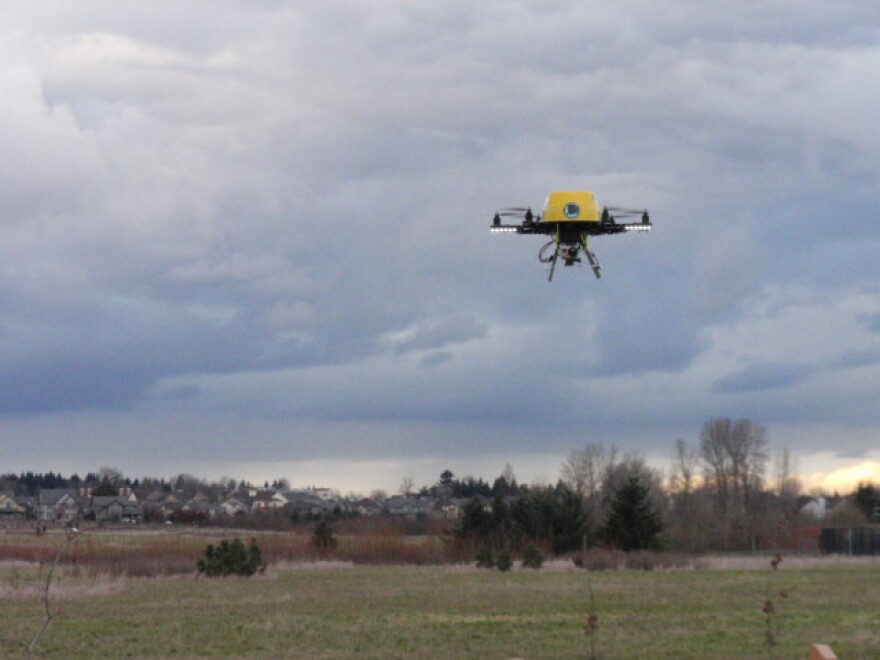Rapidly changing drone technology has some Northwest lawmakers uncomfortable. Legislators in Oregon, Washington and Idaho have introduced measures to regulate and limit the way law enforcement can use the devices. But people who fly these unmanned aircraft for fun are afraid well-intentioned regulations will criminalize their hobby.
Patrick Sherman straps on a pair of goggles and fires up a strange looking aircraft sitting in front of him.
The contraption lifts into the air and lazily flies away. Six whirring helicopter rotors give it the lift it needs. Sherman hands me a pair of goggles too. The goggles offer a view of what the aircraft is flying over...thanks to a live video feed from a camera strapped to the drone.
"I thought we would just fly over to the big sort of solitary oak tree and sort of orbit around that and then come back," Sherman says.
We're at a park in suburban Wilsonville, Oregon. Sherman controls the drone's flight with what looks like a video game joystick. Today's flight is short. The batteries powering the drone only last about seven minutes. Soon, the aircraft returns to its owner and settles to the ground.

For Sherman, flying drones is a hobby. But his hobby may be headed for some turbulence.
"Senate Bill 71 would instantly criminalize what we are doing," he says.
That's one of three bills in the Oregon legislature this year aimed at curtailing the use of drones. The bill that has Sherman incensed is also the broadest. It would make operating a drone like the one we just flew a misdemeanor.
"The definition of drone in the bill is so incredibly broad that it just encompasses all sorts of things," he says. "Literally, children's toys."
Researchers also worry that drone legislation could limit how they use the new technology. Michael Wing -- yes, Wing is his real name -- operates a drone for Oregon State University. He says he understands the privacy concerns surrounding drones. But Wing says the high-tech aircraft have a tremendous potential to aid his research into forest health.
He remembers the first time he flew a drone last fall.
"It was just astounding for me to watch that aircraft and to see this live video feed where I could make out individual trees and the nature and character of those trees as this plane flew."
The author of one of the drone bills, Oregon state Senator Floyd Prozanski, readily admits his legislation needs some tweaking. But he says drones are becoming smaller. They’re more versatile. And there's a lot more potential for abuse.
"If you're going to take an apparatus and you're actually going to hover over someone's house, their backyard where they may have a swimming pool, take photographs, I think those are the concerns that most individuals are going to want the state to be addressing," Prozanski explains.
Supporters of drone legislation are also concerned about potential misuse by government agencies, especially law enforcement. A separate Oregon bill would prevent police from using a drone without a warrant, except in the case of an unfolding emergency situation. That proposal has the backing of the American Civil Liberties Union.
"Oregon should never be a surveillance society, says Becky Straus, the ACLU's lobbyist in Salem. "So we're looking to put in place clear and transparent guidelines around how our law enforcement agencies might use drones while also protecting the privacy of Oregonians."
So far, no law enforcement agencies in Oregon use drones, though the Clackamas County Sheriff's office has applied for permission from the Federal Aviation Administration. In Seattle, the city recently grounded the two drones in use by its police department. But some lawmakers in Idaho welcome drones. The state Senate passed a resolution aimed at getting Idaho named as one of six federal drone testing sites.
On the Web:
Oregon SB 71: Restrictions on private drone use - Oregon Legislature
Oregon HB 2710: Drones and law enforcement - Oregon Legislature
Washington SB 1771: Standards for drone use - Washington Legislature
Idaho SB 1067: Drones and gathering of evidence - Idaho Legislature
Idaho SCR 103: Drone test site - Idaho Legislature



